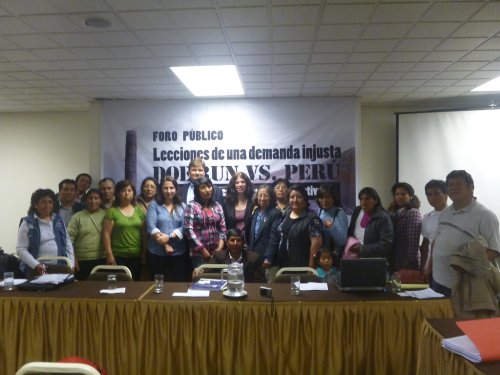Renco v. Peru (I)
- Amount demanded: US$800 million
- Outcome: Case dismissed (on jurisdictional ground)
- Treaty invoked: Peru - United States FTA
- Sector: mining
- Issue: environment
Renco v. Peru (II)
- Amount demanded: Data not available
- Outcome: Case pending
- Treaty invoked: Peru - United States FTA
- Sector: mining
- Issue: environment
by Public Citizen (updated by bilaterals.org)
Renco Group, a corporation owned by one of the wealthiest people in the United States, Ira Rennert, demanded $800 million from the government of Peru. The corporation claimed that the Peruvian government violated the U.S.-Peru FTA by not granting an extension on the firm’s overdue commitment to clean up environmental contamination. Doe Run Peru, Renco’s Peruvian subsidiary, failed to meet its environmental clean-up commitments under the terms of a 1997 privatization of a metal smelting operation in La Oroya, Peru — one of the world’s most polluted sites. The Peruvian government granted two extensions past the 2007 date by which Doe Run was to have built a sulphur oxide treatment facility – a commitment that the corporation repeatedly failed to fulfil.
In 2007 and 2008, Doe Run was challenged in class action lawsuits filed in Missouri courts, the firm’s state of incorporation. The suits demanded compensation and medical assistance for La Oroyan children that had been injured by toxic emissions from the smelter since its acquisition by Renco. In 2010, the company launched an $800 million investor-state claim against Peru under the FTA. The company claimed a violation of fair and equitable treatment, blamed Peru for not granting a third extension to comply with its unfulfilled 1997 environmental commitments, and demanded that Peru, not Renco, should have assumed liability for the Missouri cases.
Some analysts believed that Renco used the investor-state claim to derail the Missouri-based lawsuit seeking compensation for La Oroya’s children. Renco previously had tried three times to remove the case to federal court from the Missouri courts, where the jury pool was likely to be sceptical of the company after highly publicized incidents of pollution in Missouri. Renco had failed each time. But one week after launching its investor-state claim, Renco tried a fourth time to remove the case to federal courts and succeeded. The same judge that had denied the previous requests now granted it, citing the ISDS claim under the Peru FTA as the reason given federal legislation on arbitration would newly apply because of the ISDS claim.
In July 2016, after six years of costly litigation with the three ISDS tribunalists charging hundreds of dollars per hour in addition to Peru paying for its defence lawyers, the tribunal dismissed Renco’s claim. Oddly, it did so based on a jurisdictional issue it could have decided years earlier. The tribunal determined that it did not have jurisdiction over the case because the company had failed to comply fully with an FTA requirement that it had to waive certain domestic litigation rights to proceed with an ISDS claim.
However, the tribunal ruled that the Peruvian government and the corporation must split the costs of the arbitration as well as each bearing its own legal costs. This means a $8.39 million bill for Peru despite the case being dismissed and the grounds for dismissal being that the corporation failed to meet the technical rules for pursuing an ISDS claim.
At the time of the decision, Renco stated that “the Tribunal’s decision is an insignificant victory for Peru,” immediately threatening to refile the same claims after resolving the technicality upon which the case was dismissed.
In October 2018, Renco made good on its threat and filed a new claim to restart an ISDS case on the same matters.
Last update: April 2021
Read more:
- New arbitration between Renco Group and Peru at the PCA
- The Renco Group, Inc. v. Republic of Peru: An assessment of the investor’s contentions in the context of environmental degradation
- Renco failed to comply with formal waiver requirement under US–Peru Trade Promotion Agreement
- The Republic of Peru is denied recovery of legal costs despite win in Renco Group arbitration
- World Bank panel rejects lawsuit against Peru over smelter



